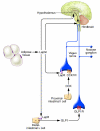Gastrointestinal regulation of food intake
- PMID: 17200702
- PMCID: PMC1716217
- DOI: 10.1172/JCI30227
Gastrointestinal regulation of food intake
Abstract
Despite substantial fluctuations in daily food intake, animals maintain a remarkably stable body weight, because overall caloric ingestion and expenditure are exquisitely matched over long periods of time, through the process of energy homeostasis. The brain receives hormonal, neural, and metabolic signals pertaining to body-energy status and, in response to these inputs, coordinates adaptive alterations of energy intake and expenditure. To regulate food consumption, the brain must modulate appetite, and the core of appetite regulation lies in the gut-brain axis. This Review summarizes current knowledge regarding the neuroendocrine regulation of food intake by the gastrointestinal system, focusing on gastric distention, intestinal and pancreatic satiation peptides, and the orexigenic gastric hormone ghrelin. We highlight mechanisms governing nutrient sensing and peptide secretion by enteroendocrine cells, including novel taste-like pathways. The increasingly nuanced understanding of the mechanisms mediating gut-peptide regulation and action provides promising targets for new strategies to combat obesity and diabetes.
Figures




References
-
- Blundell J.E., Halford J.C. Regulation of nutrient supply: the brain and appetite control. Proc. Nutr. Soc. 1994;53:407–418. - PubMed
-
- Smith, G.P. 1998. Satiation: from gut to brain. Oxford University Press. New York, New York, USA. 291 pp.
-
- Strubbe J.H., Woods S.C. The timing of meals. Psychol. Rev. 2004;111:128–141. - PubMed
-
- Gibbs J., Young R.C., Smith G.P. Cholycystokinin elicits satiety in rats with open gastric fistulas. Nature. 1973;245:323–325. - PubMed
-
- Strader A.D., Woods S.C. Gastrointestinal hormones and food intake. Gastroenterology. 2005;128:175–191. - PubMed
Publication types
MeSH terms
Substances
Grants and funding
LinkOut - more resources
Full Text Sources
Other Literature Sources
Medical

